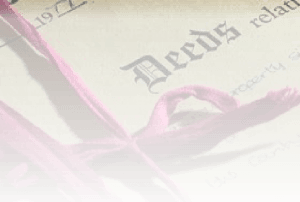Records of the great landowning families (and indeed of some of the smaller families) can provide the local and family historian with much useful information, sometimes as far back as medieval times.
TENANTS RENTALS
These are found among the larger landowning family papers which in case of GMCRO consists of the Assheton family of Middleton (Reference E7), the Egerton family of Heaton Hall (Reference E4), the Legh family of Lyme Hall (E17) and the Entwistle family of Foxholes near Rochdale (E/Fox). They give details of the names of tenants renting houses or land, the address or situation of the property, the amount of rent due and any arrears. Very often these records cover centuries rather than decades, so that it may be possible to follow the family through several generations, especially as the son would often take over the property when the father died
TITLE DEEDS
By far the most numerous type of document which has survived, title deeds can give invaluable information, but should be approached with some caution. Early deeds were written in Latin (or sometimes Norman French) and abbreviated and can therefore be difficult to read, while some legal deeds can be very verbose and repetitive and thus can be difficult to follow. Much headway, however, may be made by consulting the catalogues at GMCRO, which always list at the very least the main parties and the property involved. For those willing to persevere, title deeds can be a real mine of information. In addition to listing the names, status or occupations and addresses of the main parties, deeds will often give witness lists., boundaries or even maps of the property concerned and the terms under which the property was held. There are many different types of title deeds but those to which family historians should pay particular heed include wills, leases, grants of land and mortgages.
MANORIAL RECORDS
The only archive held by GMCRO which contains this type of record is the Assheton family papers. As they include court papers they can be useful to the genealogist for giving details of those charged with offences or in dispute as well as a lists of those serving on juries. However, they are written in Latin, so can be very difficult to read.
MILITIA
Among the papers of the Egerton family are the records of the Royal Manchester and Royal Lancashire Volunteers. They span the years 1778 to 1794 and contain useful information about recruits. In addition to the registers of volunteers, muster rolls and court martial records, there are also volunteers certificates which give details of name, age, occupation, parish of birth, height, colour of eyes and hair, complexion and signature (if they could write – most were illiterate)
